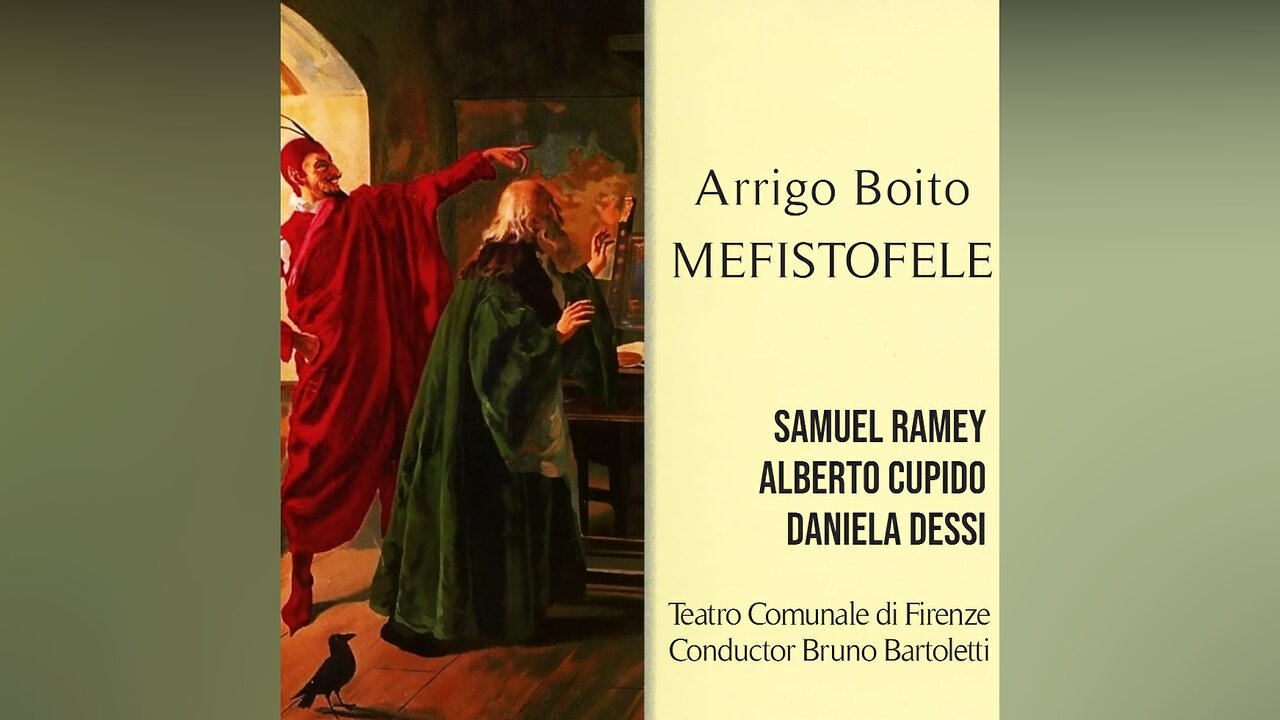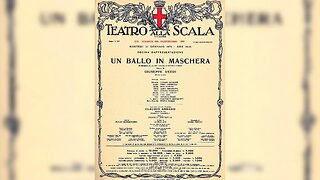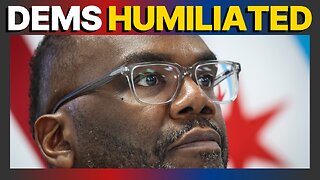Premium Only Content

Boito: Mefistofele Act I-II | Ramey, Cupido, Dessi - Bartoletti (Teatro Comunale di Firenze 1989)
Composer: Arrigo Boito
Librettist: Arrigo Boito
Premiere: 5 March 1868. La Scala (Milan)
Language: Italian
Subtitles: Italian
Act III-IV: https://rumble.com/v52tn8c-boito-mefistofele-act-iii-iv-ramey-cupido-dessi-bartoletti-teatro-comunale-.html
Mefistofele is an opera in a prologue and five acts, later reduced to four acts and an epilogue, the only completed opera with music by the Italian composer-librettist Arrigo Boito (there are several completed operas for which he was librettist only). Boito began consideration of an opera on the Faustian theme after completing his studies at the Milan Conservatory in 1861. Mefistofele is one of many pieces of classical music based on the Faust legend and, like many other composers, Boito used Goethe's version as his starting point. He was an admirer of Richard Wagner and, like him, chose to write his own libretto, something which was virtually unheard of in Italian opera up to that time. Much of the text is actually a literal translation from Goethe's German to Boito's Italian.
The opera was given its premiere on 5 March 1868 at La Scala, Milan. However, as the evening of 5 March 1868 premiere performance progressed, the hostility of the audience, unfamiliar with Boito's avant-garde musical style and unimpressed by many of the scenes, steadily increased. Furthermore, the work was far too long and the cast inadequate for the complexities of the music. When the curtain finally came down well after midnight, it was clear that the premiere had been a failure. After just two performances, both of which were hissed at by the audiences, the opera was withdrawn.
Boito immediately set to work revising his opera, greatly reduced its length by about one-third by making many scenes smaller in scale. The revised version was premiered in Bologna on 4 October 1875, this time sung by what is generally regarded to be a very fine cast, and was an immediate success. This change in reception is thought to be partly due to Boito's revisions making the opera more traditional in style, and also to the Italian audience having become familiar with, and more willing to accept, developments in opera associated with those of Richard Wagner. Boito made further minor revisions during 1876, and this version was first performed at the Teatro Rossini in Venice on 13 May 1876. Thereafter, Boito continued to make small changes until the final definitive production in Milan on 25 May 1881.
In the early 20th century, revivals of the opera were associated particularly with the famous Russian bass Feodor Chaliapin. In 1969, the New York City Opera presented a new production by Tito Capobianco, with Norman Treigle scoring his greatest success in the title role. As Mefistofele, Samuel Ramey made the role a signature one, appearing in many productions in the 1980s and early 1990s.
Cast & Characters:
Mefistofele - Samuel Ramey
Faust - Alberto Cupido
Margherita - Daniela Dessi
Elena - Graciela von Gyldenfeldt
Martha - Laura Zannini
Wagner - Romano Emili
Pantalis - Monica Tagliasacchi
Nereo - Francesco Memeo
Teatro Comunale di Firenze Orchestra & Chorus
Conductor: Bruno Bartoletti
Stage Director: Carlo Maestrini
Prologue: A heavenly chorus praises God the Creator. Mefistofele scornfully declares that he can win the soul of Faust. His challenge is accepted by the Forces of Good.
Act I - Scene 1: The aged Dr. Faust and his pupil Wagner are watching the Easter celebrations in the main square in Frankfurt. Faust senses that they are being followed by a mysterious friar, about whom he senses something evil. Wagner dismisses his master's feelings of unease and as darkness falls they return to Faust's home
Act I - Scene 2: Faust is in his study, deep in contemplation. His thoughts are disturbed in dramatic fashion by the sudden appearance of the sinister friar, whom he now recognizes as a manifestation of the Devil (Mefistofele). Far from being terrified, Faust is intrigued and enters into a discussion with Mefistofele culminating in an agreement by which he will give his soul to the devil on his death in return for worldly bliss for the remainder of his life.
Act II - Scene 1: Restored to his youth, Faust has infatuated Margareta, an unsophisticated village girl. She is unable to resist his seductive charms and agrees to drug her mother with a sleeping draught and meet him for a night of passion. Meanwhile Mefistofele amuses himself with Martha, another of the village girls.
Act II - Scene 2: Mefistofele has carried Faust away to witness a Witches' Sabbath on the Brocken mountain. The devil mounts his throne and proclaims his contempt for the World and all its worthless inhabitants. As the orgy reaches its climax Faust sees a vision of Margareta, apparently in chains and with her throat cut. Mefistofele reassures him that the vision was a false illusion.
-
 2:50:06
2:50:06
Adaneth - Arts & Literature
1 month agoVerdi: Un Ballo in Maschera | Pavarotti, Cappuccilli-Abbado, Zeffirelli (La Scala 1978-ENG&ITA SUB)
88 -
 26:00
26:00
DeVory Darkins
1 day ago $7.66 earnedDemocrat Mayor HUMILIATES himself during painful interview as Trump makes SHOCKING Announcement
8.62K55 -
 1:03:43
1:03:43
Dialogue works
1 day ago $0.40 earnedCol. Larry Wilkerson: Warning Signs Everywhere: U.S. on the Verge of Disaster
8884 -
 1:09:42
1:09:42
Mike Rowe
7 days agoHow Did THIS Dirty Job Make Tommy Mello A Billionaire?! | #447 | The Way I Heard It
84.5K20 -
 2:01:37
2:01:37
MG Show
17 hours agoTrump Says Soros Should be Charged with RICO; Bill Gates Pulls Out of Arabella Advisors
8.79K22 -
 1:14:00
1:14:00
Steve-O's Wild Ride! Podcast
6 days agoLilly Singh Talks S*x Education With Steve-O | Wild Ride #264
3.09K2 -
 52:48
52:48
Futures Edge: Finance Unfiltered with Jim Iuorio and Bob Iaccino
1 day ago $0.01 earnedTrump’s Latest Initiatives Explained
14.8K -
 4:36:31
4:36:31
FreshandFit
9 hours agoAfter Hours w/ Girls
61.5K97 -
 10:32
10:32
Nikko Ortiz
14 hours agoFunniest Fails Of The Month
20.6K3 -
 2:04:11
2:04:11
Side Scrollers Podcast
17 hours agoCracker Barrel CANCELS Rebrand + OG YouTuber Has Brain Tumor + More | Side Scrollers IN STUDIO
28.5K4